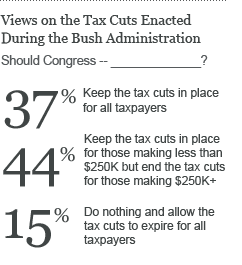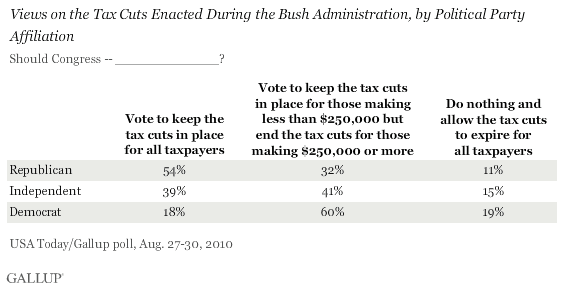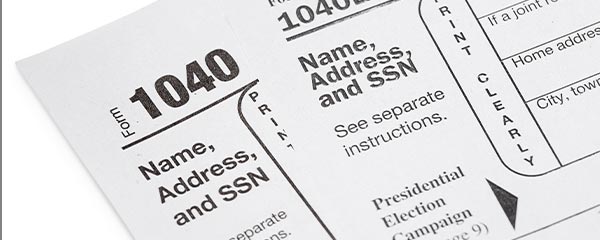PRINCETON, NJ -- A majority of Americans favor letting the tax cuts enacted during the Bush administration expire for the wealthy. While 37% support keeping the tax cuts for all Americans, 44% want them extended only for those making less than $250,000 and 15% think they should expire for all taxpayers.

These results are based on an Aug. 27-30 USA Today/Gallup poll. The fate of the 2001 and 2003 federal income tax cuts that were a centerpiece of Bush administration policy could be a significant campaign issue this fall. The tax cuts are set to expire after this year unless Congress votes to extend them. Congress plans to take up the issue next week when it returns to session.
It appears as though Congress, like the American public, broadly agrees that the tax cuts should be extended for American families earning less than $250,000. The debate Congress will have this fall will be over whether to extend the tax cuts for wealthier Americans. Most Republicans and some Democrats in Congress are thought to favor extending them for wealthier Americans. President Obama said Wednesday that he is opposed to any plan that would extend the tax cuts for wealthier Americans.
The president's views on ending the tax cuts for wealthy Americans are in line with the views of the majority of rank-and-file Democrats. Meanwhile, the majority of Republicans want the tax cuts extended for all taxpayers, regardless of their income level. Independents' views fall between those of the two groups, but a majority (56%) would seem to endorse the idea of not extending tax cuts for higher-income Americans, whether or not they want them extended for middle- and lower-income Americans.

Bottom Line
With about one in three Americans, including a minority of independents and Democrats, in favor of extending the Bush-era tax cuts for all taxpayers, Democrats may not be putting themselves at great political risk by allowing the tax cuts to expire for wealthy Americans. In fact, the middle ground of extending tax cuts for low- and middle-income Americans but allowing them to expire for wealthy Americans -- the Democrats' most likely proposal -- is the specific option the public prefers most.
Gallup has typically found Americans unsympathetic to the argument that upper-income Americans are overtaxed. They generally believe upper-income Americans pay too little in taxes and favor higher taxes on wealthy Americans as a means to fund government programs, such as Social Security.
Results for this USA Today/Gallup poll are based on telephone interviews conducted Aug. 27-30, 2010, with a random sample of 1,021 adults, aged 18 and older, living in the continental U.S., selected using random-digit-dial sampling.
For results based on the total sample of national adults, one can say with 95% confidence that the maximum margin of sampling error is ±4 percentage points.
Interviews are conducted with respondents on landline telephones (for respondents with a landline telephone) and cellular phones (for respondents who are cell phone-only). Each sample includes a minimum quota of 150 cell phone-only respondents and 850 landline respondents, with additional minimum quotas among landline respondents for gender within region. Landline respondents are chosen at random within each household on the basis of which member had the most recent birthday.
Samples are weighted by gender, age, race, education, region, and phone lines. Demographic weighting targets are based on the March 2009 Current Population Survey figures for the aged 18 and older non-institutionalized population living in continental U.S. telephone households. All reported margins of sampling error include the computed design effects for weighting and sample design.
In addition to sampling error, question wording and practical difficulties in conducting surveys can introduce error or bias into the findings of public opinion polls.
View methodology, full question results, and trend data.
For more details on Gallup's polling methodology, visit https://www.gallup.com/.
